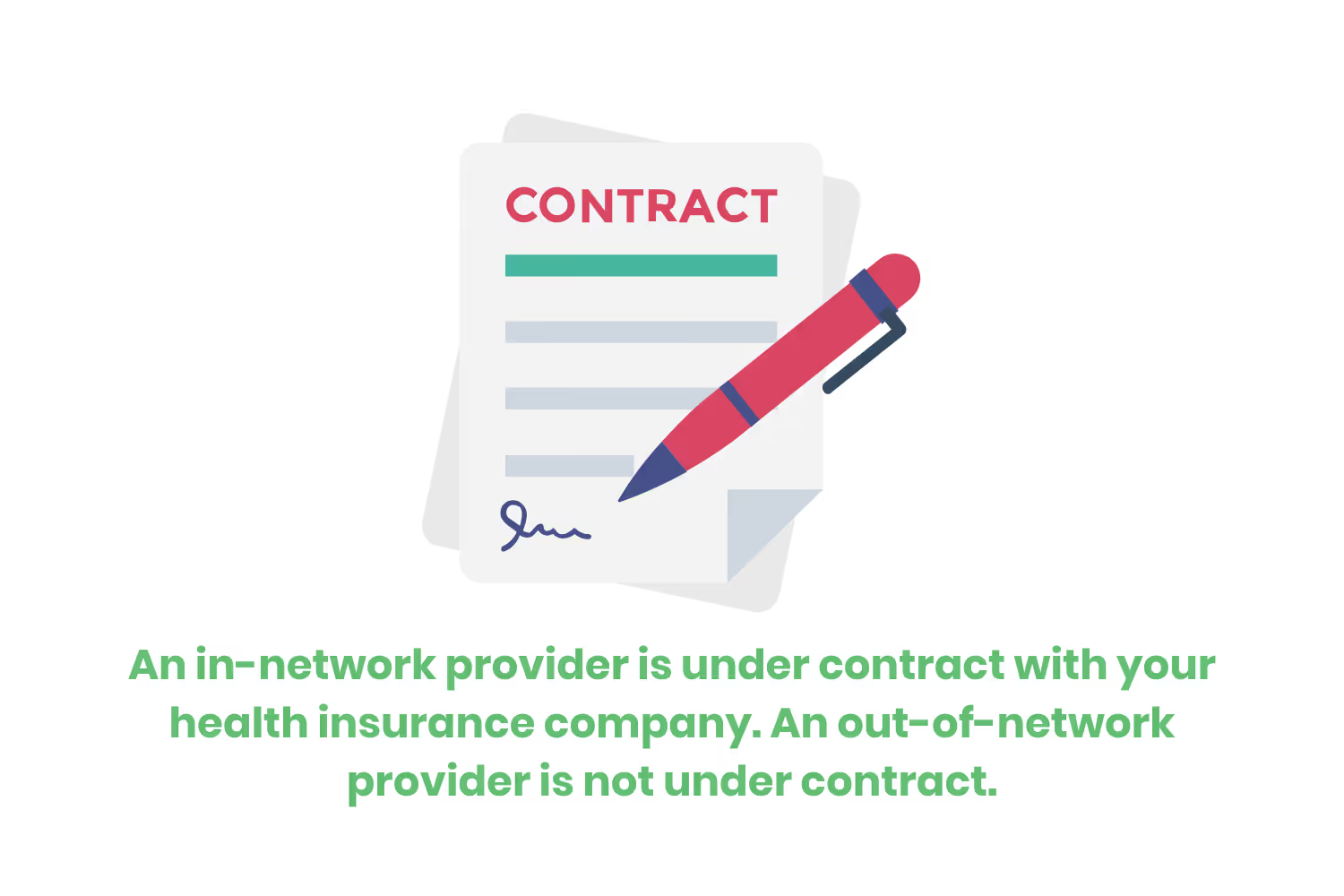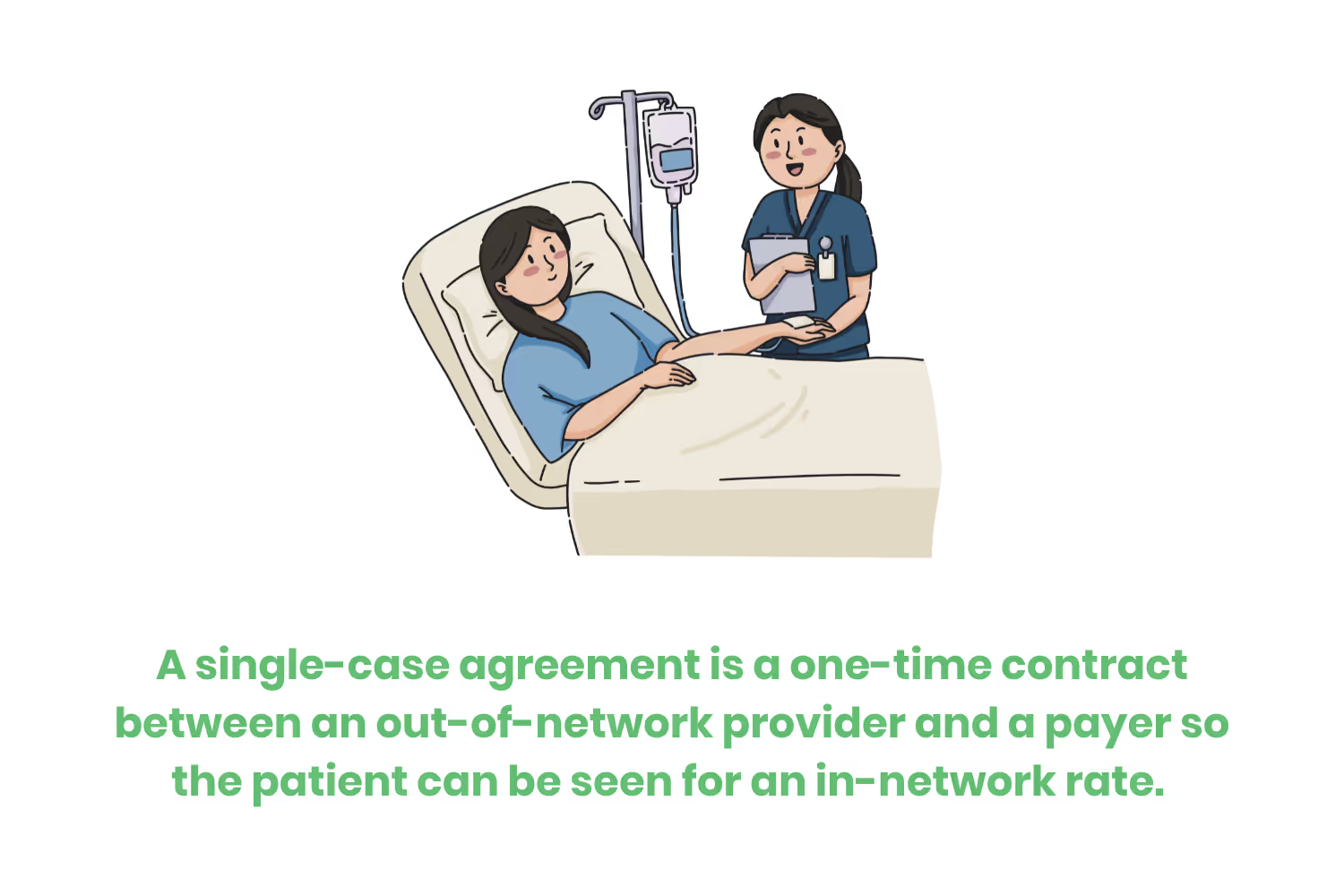[ANSWERED] How to Get Insurance to Cover Out-of-Network
In this blog, we will go over the basics of health insurance and how to research where to go for out-of network care. As well as ways to communicate with your insurer that this out-of-network care is necessary and request that they should cover it.

American healthcare accessibility and insurance policies remain a hot topic in the US. Although about 90% of adults in America have some sort of health insurance, many still struggle with medical debt.
Especially when dealing with out-of-network costs. Receiving care from a professional within your insurance plan costs less, but is not always attainable. Depending on what you or a family member needs treatment for, you may need to seek uncovered care.

This is the difficult choice many Americans must make when considering their healthcare needs. Although you might pay more for out-of-network care, we have a few tips that can help you make the most educated choice.
In this blog, we will go over the basics of health insurance and how to research where to go for out-of network care. As well as ways to communicate with your insurer that this out-of-network care is necessary and request that they should cover it.
The Basics of Health Insurance Coverage
First, let’s go over what exactly health insurance is and why it’s so important to have. Health insurance is a legally bound contract that helps a patient pay for their healthcare services.
Generally, through a health insurance company in exchange for a premium. This offers important financial protection in case you or a loved one comes down with a sudden illness or injury.

A premium is the amount of money a patient pays for health insurance. Usually, payments come out bi-weekly, monthly, quarterly, or sometimes yearly.
Let’s go over a few more important definitions regarding insurance costs while we are on the topic:
- Cost Sharing: This is the sharing of costs (imagine that) which patients must pay out-of-pocket for covered services. This usually covers deductibles, coinsurance, and copayments. Which is a great segue for our next terms!
- Deductible: What a patient must pay for covered services before their insurance kicks in. By “kicks in” I mean “helps to pay for services”. Plans may have separate deductibles for specific services. Such as in-network versus out-of-network deductibles.
- Copayment: The fixed amount a patient pays for after they pay their deductible.
- Coinsurance: Percentage of covered medical bills that a patient pays after hitting their deductible.
There are many different kinds of healthcare plans with various amounts of coverage. These plans, or packages, specify what the insurance company is willing to cover in terms of items and services. As well as to what extent. Usually, the more you pay through your premium, the better the coverage.
So long as you visit a doctor who is from your health insurance’s approved list, you are seeing an in-network provider.
This means that that specific provider is under contract with your health insurance company. Therefore, a percentage of your services and/or procedures are likely covered.

But like I mentioned before, sometimes you need to seek out-of-network care. This means that these providers are not under contract with your health insurance.
So even if your insurance may cover some out-of-network costs, it is still likely going to be more expensive than in-network. And that is assuming you meet your deductible beforehand. Note that out-of-network providers are also often called “non-preferred” or “non-participating” providers.
Out-of-Network Care for an In-Network Rate
Again, for many people, this isn’t so much of a choice but a last resort.
Some health insurance plans do not offer coverage for specialized care. For example, rare illnesses or certain types of cancer treatments.
However, this doesn’t necessarily mean you are to be stuck fronting the entire bill. There are ways to work with your insurance companies or providers to help accommodate your financial needs.
Other situations resulting in needing out-of-network care can include the following:
- You have an emergency and get taken to a hospital that is out of your network.
- You live in a remote area that doesn’t have the network you need to receive proper care.
- You’re treated by an in-network doctor for a serious condition, but then have to switch networks. That doctor is no longer covered, due to the limitations of your new plan’s network. Your doctor could also choose to leave your network mid-treatment.
- Natural disasters can force people to evacuate to areas that their network does not cover.
- Having your child move away to college and need to belong to an outside network of doctors closer to their school. This is a “guest membership” and allows your child to be a guest in that network of doctors. Some plans may have “travel” networks, too.
The good news is that all of these situations have the potential to cost the same as your regular in-network rate. If not the same, then close to it. It just depends on your healthcare plan and the laws of your state. Let’s go over a few tips on how to navigate out-of-network care.
Negotiate with Your Insurance Company
There are some instances where you may be able to get prior approval from your health insurance to seek out-of-network care for an in-network rate. This would involve making a formal request with your insurer.
These requests are also known as “appeals”. Don’t panic, this may all seem a bit confusing but luckily for you, your primary care provider will likely send this to your insurance for you. If you want to send the request yourself, you can find the process on your insurer’s website or call customer service.

There is also the option of a single-case agreement between your insurance company and an out-of-network provider. This is a one-time contract between an out-of-network provider and a payer so the patient can see said provider for an in-network rate.
If your doctor determines that you need to go out-of-network is a medical necessity, this helps legally protect you and your right to treatment.
Alternative Solutions
Alternative payment solutions such as Health Savings Accounts (HSAs) and Flexible Spending Accounts (FSAs) are another way to obtain affordable out-of-network care. By utilizing funds from these accounts, you can more easily offset the higher costs of out-of-network care.
Both HSAs and FSAs allow you to contribute to pre-tax dollars. This means that the funds you transfer to these accounts are not subject to federal income tax. This can pay for different medical expenses such as deductibles, copayments, and coinsurance.
Be Your Own Advocate
If you do go out-of-network, whether through a doctor referral or on your own, be sure to keep all of your medical paperwork in order. Being your own advocate and keeping detailed records of all communications with your insurance company is key. Especially when seeking out-of-network care and negotiating rates.
The No Surprise Act also protects those who do not have a chance to seek in-network care under certain circumstances.

These circumstances include:
- Most emergency services.
- Non-emergency items and services from out-of-network providers while receiving treatment through certain in-network facilities.
- Most services from out-of-network air ambulance providers (this does not include ground ambulance services).
Surprise billing is a certain kind of balance billing, often associated with out-of-network care. This act protects against unexpected medical bills for out-of-network costs that are not covered.
Conclusion
Using out-of-network care can be daunting, but it’s often necessary to get the best treatment. To minimize costs, start by understanding your insurance policy, including coverage limits and exceptions. Advocate for yourself by negotiating rates with your insurer, exploring single-case agreements, or filing appeals for medical necessity. Tools like HSAs and FSAs can also help offset higher costs.
Keep detailed records of all communications with providers and insurers to resolve billing issues and disputes effectively. Remember, laws like the No Surprises Act protect against unexpected medical bills in certain situations. With preparation, communication, and persistence, you can navigate out-of-network care while protecting your financial health.
Emphasize your product's unique features or benefits to differentiate it from competitors
In nec dictum adipiscing pharetra enim etiam scelerisque dolor purus ipsum egestas cursus vulputate arcu egestas ut eu sed mollis consectetur mattis pharetra curabitur et maecenas in mattis fames consectetur ipsum quis risus mauris aliquam ornare nisl purus at ipsum nulla accumsan consectetur vestibulum suspendisse aliquam condimentum scelerisque lacinia pellentesque vestibulum condimentum turpis ligula pharetra dictum sapien facilisis sapien at sagittis et cursus congue.
- Pharetra curabitur et maecenas in mattis fames consectetur ipsum quis risus.
- Justo urna nisi auctor consequat consectetur dolor lectus blandit.
- Eget egestas volutpat lacinia vestibulum vitae mattis hendrerit.
- Ornare elit odio tellus orci bibendum dictum id sem congue enim amet diam.
Incorporate statistics or specific numbers to highlight the effectiveness or popularity of your offering
Convallis pellentesque ullamcorper sapien sed tristique fermentum proin amet quam tincidunt feugiat vitae neque quisque odio ut pellentesque ac mauris eget lectus. Pretium arcu turpis lacus sapien sit at eu sapien duis magna nunc nibh nam non ut nibh ultrices ultrices elementum egestas enim nisl sed cursus pellentesque sit dignissim enim euismod sit et convallis sed pelis viverra quam at nisl sit pharetra enim nisl nec vestibulum posuere in volutpat sed blandit neque risus.

Use time-sensitive language to encourage immediate action, such as "Limited Time Offer
Feugiat vitae neque quisque odio ut pellentesque ac mauris eget lectus. Pretium arcu turpis lacus sapien sit at eu sapien duis magna nunc nibh nam non ut nibh ultrices ultrices elementum egestas enim nisl sed cursus pellentesque sit dignissim enim euismod sit et convallis sed pelis viverra quam at nisl sit pharetra enim nisl nec vestibulum posuere in volutpat sed blandit neque risus.
- Pharetra curabitur et maecenas in mattis fames consectetur ipsum quis risus.
- Justo urna nisi auctor consequat consectetur dolor lectus blandit.
- Eget egestas volutpat lacinia vestibulum vitae mattis hendrerit.
- Ornare elit odio tellus orci bibendum dictum id sem congue enim amet diam.
Address customer pain points directly by showing how your product solves their problems
Feugiat vitae neque quisque odio ut pellentesque ac mauris eget lectus. Pretium arcu turpis lacus sapien sit at eu sapien duis magna nunc nibh nam non ut nibh ultrices ultrices elementum egestas enim nisl sed cursus pellentesque sit dignissim enim euismod sit et convallis sed pelis viverra quam at nisl sit pharetra enim nisl nec vestibulum posuere in volutpat sed blandit neque risus.
Vel etiam vel amet aenean eget in habitasse nunc duis tellus sem turpis risus aliquam ac volutpat tellus eu faucibus ullamcorper.
Tailor titles to your ideal customer segment using phrases like "Designed for Busy Professionals
Sed pretium id nibh id sit felis vitae volutpat volutpat adipiscing at sodales neque lectus mi phasellus commodo at elit suspendisse ornare faucibus lectus purus viverra in nec aliquet commodo et sed sed nisi tempor mi pellentesque arcu viverra pretium duis enim vulputate dignissim etiam ultrices vitae neque urna proin nibh diam turpis augue lacus.




